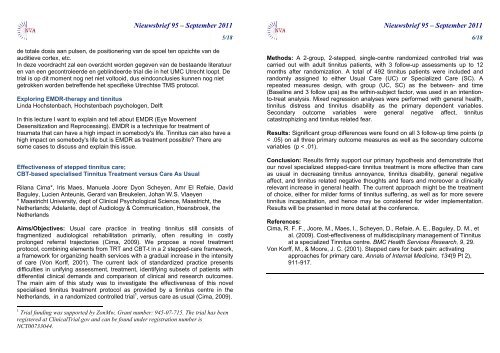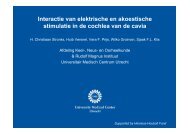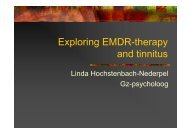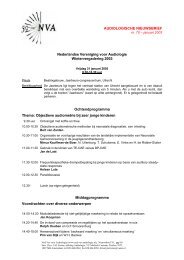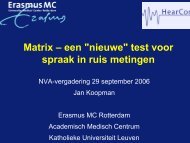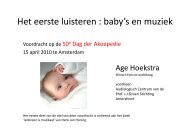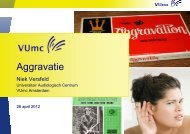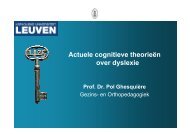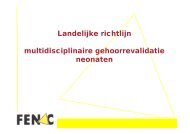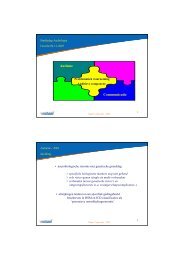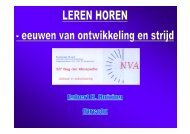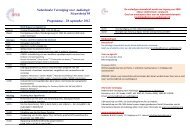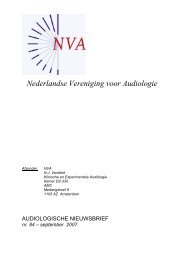Nederlandse Vereniging Voor Audiologie Nieuwsbrief 95 - Ned.Ver ...
Nederlandse Vereniging Voor Audiologie Nieuwsbrief 95 - Ned.Ver ...
Nederlandse Vereniging Voor Audiologie Nieuwsbrief 95 - Ned.Ver ...
Create successful ePaper yourself
Turn your PDF publications into a flip-book with our unique Google optimized e-Paper software.
<strong>Nieuwsbrief</strong> <strong>95</strong> – September 2011<br />
de totale dosis aan pulsen, de positionering van de spoel ten opzichte van de<br />
auditieve cortex, etc.<br />
In deze voordracht zal een overzicht worden gegeven van de bestaande literatuur<br />
en van een gecontroleerde en geblindeerde trial die in het UMC Utrecht loopt. De<br />
trial is op dit moment nog net niet voltooid, dus eindconclusies kunnen nog niet<br />
getrokken worden betreffende het specifieke Utrechtse TMS protocol.<br />
Exploring EMDR-therapy and tinnitus<br />
Linda Hochstenbach, Hochstenbach psychologen, Delft<br />
In this lecture I want to explain and tell about EMDR (Eye Movement<br />
Desensitization and Reprocessing). EMDR is a technique for treatment of<br />
traumata that can have a high impact in somebody's life. Tinnitus can also have a<br />
high impact on somebody's life but is EMDR as treatment possible? There are<br />
some cases to discuss and explain this issue.<br />
Effectiveness of stepped tinnitus care;<br />
CBT-based specialised Tinnitus Treatment versus Care As Usual<br />
Rilana Cima*, Iris Maes, Manuela Joore , Dyon Scheyen, Amr El Refaie, David<br />
Baguley, Lucien Anteunis, Gerard van Breukelen, Johan W.S. Vlaeyen<br />
* Maastricht University, dept of Clinical Psychological Science, Maastricht, the<br />
Netherlands; Adelante, dept of Audiology & Communication, Hoensbroek, the<br />
Netherlands<br />
Aims/Objectives: Usual care practice in treating tinnitus still consists of<br />
fragmentized audiological rehabilitation primarily, often resulting in costly<br />
prolonged referral trajectories (Cima, 2009). We propose a novel treatment<br />
protocol, combining elements from TRT and CBT-t in a 2 stepped-care framework,<br />
a framework for organizing health services with a gradual increase in the intensity<br />
of care (Von Korff, 2001). The current lack of standardized practice presents<br />
difficulties in unifying assessment, treatment, identifying subsets of patients with<br />
differential clinical demands and comparison of clinical and research outcomes.<br />
The main aim of this study was to investigate the effectiveness of this novel<br />
specialised tinnitus treatment protocol as provided by a tinnitus centre in the<br />
Netherlands, in a randomized controlled trial 1 , versus care as usual (Cima, 2009).<br />
1 Trial funding was supported by ZonMw, Grant number: 945-07-715. The trial has been<br />
registered at ClinicalTrial.gov and can be found under registration number is<br />
NCT00733044.<br />
5/18<br />
<strong>Nieuwsbrief</strong> <strong>95</strong> – September 2011<br />
Methods: A 2-group, 2-stepped, single-centre randomized controlled trial was<br />
carried out with adult tinnitus patients, with 3 follow-up assessments up to 12<br />
months after randomization. A total of 492 tinnitus patients were included and<br />
randomly assigned to either Usual Care (UC) or Specialized Care (SC). A<br />
repeated measures design, with group (UC, SC) as the between- and time<br />
(Baseline and 3 follow ups) as the within-subject factor, was used in an intentionto-treat<br />
analysis. Mixed regression analyses were performed with general health,<br />
tinnitus distress and tinnitus disability as the primary dependent variables.<br />
Secondary outcome variables were general negative affect, tinnitus<br />
catastrophizing and tinnitus related fear.<br />
Results: Significant group differences were found on all 3 follow-up time points (p<br />
< .05) on all three primary outcome measures as well as the secondary outcome<br />
variables (p < .01).<br />
Conclusion: Results firmly support our primary hypothesis and demonstrate that<br />
our novel specialized stepped-care tinnitus treatment is more effective than care<br />
as usual in decreasing tinnitus annoyance, tinnitus disability, general negative<br />
affect, and tinnitus related negative thoughts and fears and moreover a clinically<br />
relevant increase in general health. The current approach might be the treatment<br />
of choice, either for milder forms of tinnitus suffering, as well as for more severe<br />
tinnitus incapacitation, and hence may be considered for wider implementation.<br />
Results will be presented in more detail at the conference.<br />
References:<br />
Cima, R. F. F., Joore, M., Maes, I., Scheyen, D., Refaie, A. E., Baguley, D. M., et<br />
al. (2009). Cost-effectiveness of multidisciplinary management of Tinnitus<br />
at a specialized Tinnitus centre. BMC Health Services Research, 9, 29.<br />
Von Korff, M., & Moore, J. C. (2001). Stepped care for back pain: activating<br />
approaches for primary care. Annals of Internal Medicine, 134(9 Pt 2),<br />
911-917.<br />
6/18


